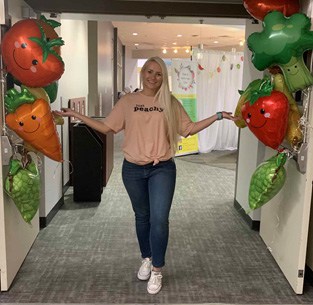The bright, sharp citrus taste of an orange; the drowsy, comforting aroma of turkey in the oven; the snap and crunch of fresh vegetables. Everyone has the foods they turn to for equal parts fuel and support, but the complexity of our diets goes far beyond cook times and calorie counts.
Today we focus on the dietetics program offered as one of our Bachelor of Science programs. Dietetics is a field of national interest for medical research institutions across the United States, and Life University can help you be part of that conversation. But what is dietetics‒we have all seen the food pyramid, so why would you need a college degree in order to tell people to lay off the sweets?
“Life University dietetics is different because we’re small, but we’re innovative. We have state-of-the-art kitchens. Each professor you encounter is a specialist in his or her field – from community to clinical to food service,” Tiffany Brown, B.S. Dietetics and M.S. Clinical Nutrition Alumna shared. “You get real professional experience from those who have worked it and know it, and you have hands-on access to that faculty.”
Dietetics offers a much more detailed understanding of nutrition than simply answering what should be on the menu‒instead, this field goes to the micro level of analyzing the makeup and properties of the vitamins our body needs, as well as zooming out to the macro levels of considering the dietary requirements of entire communities. Instead of turning our attention to chemical compounds, let’s take a brief look at the kinds of courses a dietetics student may choose as she pursues her ambitions at LIFE. The study of nutrition is grounded in the fields of biology and chemistry; neither culinary excellence nor nutritional balance are possible without a deep understanding of the elemental basics of what we are putting into our bodies. Beyond the nitty gritty of what a carbohydrate actually is, Dietetics also studies the economies and cultures surrounding food production. For instance, students in the “Community Nutrition” course would focus on questions of state and national “data gathering, policy making, healthcare delivery, health promotion, and prevention of disease” while students in “Menu Planning & Computers in Nutritional Analysis” will focus on cutting-edge methods of lab research. Not everything comes down to numbers and equations either, as courses such as “Modernist Cuisine” also function on the social and historical components of how our diets have changed over time.

Jessie Hulsey is from Ball Ground, Georgia and studying Dietetics at Life University. “My whole family is from Georgia, and we are the typical southern family that enjoys our cornbread, gravy and biscuits.” When Hulsey’s brother was fourteen, he was diagnosed with Type 1 diabetes, and her family changed their diets to suddenly revolve around his needs. “Every nutrition education handout that he received I also read,” Hulsey explained. “I was fascinated when I learned more about what was in our foods that we ate regularly, and that is what started me on this path to discovering my passion for nutrition.”
This is all to say that dietetics and the study of nutrition isn’t all about hoping to be LeBron James’s personal dietary consultant, nor are you simply trying to police people’s sugar intake. The French philosopher Michel Foucault focused near the end of his career on the question of how institutions and government ensure the health of their citizens as a sort of raw good in itself; the thinking being that not only do we have a responsibility to help and protect each other, but that the health of a nation is inextricably linked to the quality of life experienced by its citizens. The term he used for this was “biopolitics” ‒ quite literally meaning questions of how to structure human society to maximize life expectancy. Dietetics could not have a clearer aim in mind as it combines the observational methods of science with policy-oriented thinking at massive scales. The study of nutrition can lead us to help communities such as schools or hospitals are preserving the health of their members but can also deepen your personal enrichment with one of life’s simplest pleasures‒a good meal.

Social Media